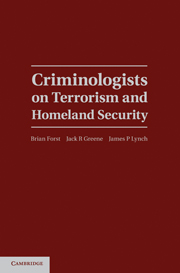Book contents
- Frontmatter
- Contents
- About the Authors
- Preface
- 1 Introduction and Overview
- PART I NATURE OF THE PROBLEM
- PART II STRATEGIES FOR INTERVENTION
- 7 Is Crime Prevention Relevant to Counterterrorism?
- 8 Implications of Opportunity Theory for Combating Terrorism
- 9 Soldiers and Spies, Police and Detectives
- 10 Community Policing and Terrorism
- 11 Go Analyze!
- 12 Managing the Fear of Terrorism
- 13 Should Profiling Be Used to Prevent Terrorism?
- 14 Federal-Local Coordination in Homeland Security
- 15 Liberty and Security in an Era of Terrorism
- 16 Regulating Terrorism
- PART III THINKING ABOUT TOMORROW
- Index
- References
15 - Liberty and Security in an Era of Terrorism
Published online by Cambridge University Press: 04 February 2011
- Frontmatter
- Contents
- About the Authors
- Preface
- 1 Introduction and Overview
- PART I NATURE OF THE PROBLEM
- PART II STRATEGIES FOR INTERVENTION
- 7 Is Crime Prevention Relevant to Counterterrorism?
- 8 Implications of Opportunity Theory for Combating Terrorism
- 9 Soldiers and Spies, Police and Detectives
- 10 Community Policing and Terrorism
- 11 Go Analyze!
- 12 Managing the Fear of Terrorism
- 13 Should Profiling Be Used to Prevent Terrorism?
- 14 Federal-Local Coordination in Homeland Security
- 15 Liberty and Security in an Era of Terrorism
- 16 Regulating Terrorism
- PART III THINKING ABOUT TOMORROW
- Index
- References
Summary
INTRODUCTION
Not only did the events of September 11, 2001 (henceforth 9/11) have a profound effect on our national and international psyches, but they also prompted a radical reconsideration and even revision of seemingly well-established moral responses. The racial profiling by police that had been recently condemned by public opinion and official inquiry was often revived with a different attitude and outcome when the perpetrators of the 9/11 attacks were identified. Governmental surveillance that would have been considered incompatible with a free society was suddenly and overwhelmingly enshrined in what, without a trace of irony, was called the USA PATRIOT Act. Even the revulsion against torture that seemingly required no further justification has been reviewed and reconstructed in official memoranda and public debate.
This was not, of course, the first time that some of these issues had been broached. National security has a long history of debate associated with it. The Korematsu (1944) decision of World War II, sanctioning the internment of large numbers of Japanese Americans, was only one of the more notorious occasions on which such debate occurred. Other incidents during the Vietnam War (e.g., the publication of the Pentagon Papers and violation of Daniel Ellsberg's privacy rights) excited similar concerns. Secret CIA manuals prepared for Latin American military use crossed the public radar screen in the late 1980s and early 1990s.
- Type
- Chapter
- Information
- Criminologists on Terrorism and Homeland Security , pp. 357 - 382Publisher: Cambridge University PressPrint publication year: 2011
References
- 4
- Cited by



